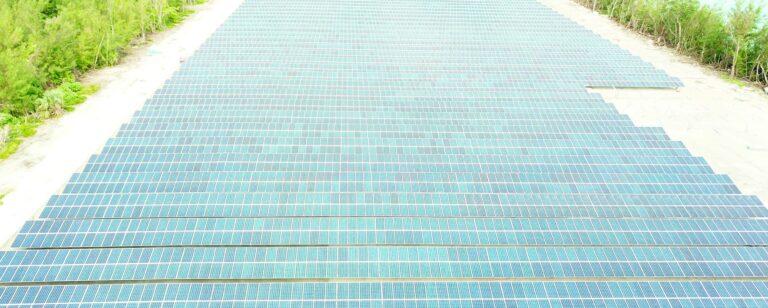Canadian parent company sets sights on net-zero emissions
BY SCOTT NEIL
Bermuda could one day have its electricity needs supplied completely from renewable energy. That’s the goal of the Bermuda Electric Light Company Ltd, which has committed to reducing its dependence on fossil fuels.
Algonquin Power and Utilities Corporation, the Canadian company that acquired Belco’s parent company Ascendant in 2020, pledged to invest $300 million in renewables in Bermuda.
Belco’s initiative to reduce dependence on fossil fuels has been named B-100. In preparation it has been modernising the electricity grid, which is currently limited in its capacity to support large-scale renewable generation.
New transmission cables are being installed in multi-service duct banks that will eliminate the need to dig up roads for cable replacement in the foreseeable future.
In November, a privately run solar farm on the disused runway at LF Wade International Airport became commercially operational. The facility, operated by Saturn Solar Power Bermuda, can generate up to 6MW of electricity. This electricity is purchased by Belco and fed into its electricity grid, reducing the amount of power that Belco has to generate from its power plant.
Belco worked with the solar farm developers to build and upgrade infrastructure to enable the solar-generated electricity to be delivered to the grid.
With regard to Bermuda’s current Integrated Resource Plan, Belco is closely evaluating offshore wind as a possible renewable energy solution for Bermuda.
In May, during an online forum, Krista Barnes, Belco’s director of communications and sustainability, said a new sustainability team was in the initial phases of investigating how to achieve Belco’s goal of becoming a 100 per cent renewable energy company.
She said: “We are ensuring that our grid is stable and that once renewables do come online we can accommodate them.
“Also within the team, we are working under the advisement of the Regulatory Authority and are looking to execute the IRP, which states that we will be 85 per cent renewable, but we are hoping that we can push that to 100 per cent.”
Also speaking at the forum, Mark Pacheco, Belco’s director of occupational health, safety and environment and business continuity, said: “The company is investigating the use of cleaner fuel to help reduce emissions.” He said Belco was looking at options, including liquefied natural gas, bio diesel, bio fuels, as well as lower sulphur and carbon options.
The UN climate change conference, COP 26, held in Glasgow, Scotland, in November, renewed urgent calls for countries to cut greenhouse gas emissions and commit to other measures to limit global warming to 1.5 Celsius above pre-industrial levels. Scientists have warned that the Earth’s climate is likely to experience severe effects if the global temperature rises more than 1.5C.
Belco’s ultimate parent, Algonquin, has embarked on a mission to achieve net-zero greenhouse gas emissions by 2050 for its business operations. It has embarked on a set of interim targets for the period 2017 to 2023. It has already achieved one of its three targets and is well on the way to achieving the others.
The interim target reached ahead of schedule is the reduction of greenhouse gas emissions by one million metric tonnes compared to 2017 levels. At the end of August this year, the company had reduced its greenhouse gas emissions by 1.1 million metric tonnes. That represents a 31 per cent decrease compared to the base year of 2017.
Belco emissions are included in that data. The calculation includes a preliminary base year emissions estimate for Ascendant, and actual emissions data since the acquisition of the group in November 2020.
The other interim targets for Algonquin include adding 2,000 MW of renewables between 2019 and 2023. At the end of August it had added 1,418MW, and had another 414MW of renewable generation in construction. The company set itself a target of 75 per cent renewable generation by 2023; at the end of August it has achieved 63 per cent.
Algonquin said it supports the global goal of limiting planetary temperature rise of less than two degrees Celsius this century “and reduce the impact of climate change by leveraging emerging technologies and business models to decarbonise our energy portfolio”.
As it continues its path to net-zero emissions, Algonquin said it will establish more interim targets.
Algonquin’s projected pathway to net-zero emissions of CO2 by 2050 will see only incremental reduction in greenhouse gas emissions between now and 2040. Then, in the ten years leading up to 2050, emissions will fall from about two million tonnes of CO2 to zero.
The company said the 2020-2048 period involves “reduction opportunities, evolving technology, supportive policy and regulation and asset life cycles”, while the 2040-2050 period will see the application for emerging technology.
Arun Banskota, president and chief executive officer of Algonquin, writing in the company’s 2021 ESG Report, said: “Throughout our 33 years of existence as a company, we ourselves have never added to the global stock of emissions by developing thermal or coal-based facilities. At the same time, we pride ourselves on being good stewards of energy and water infrastructure.”

